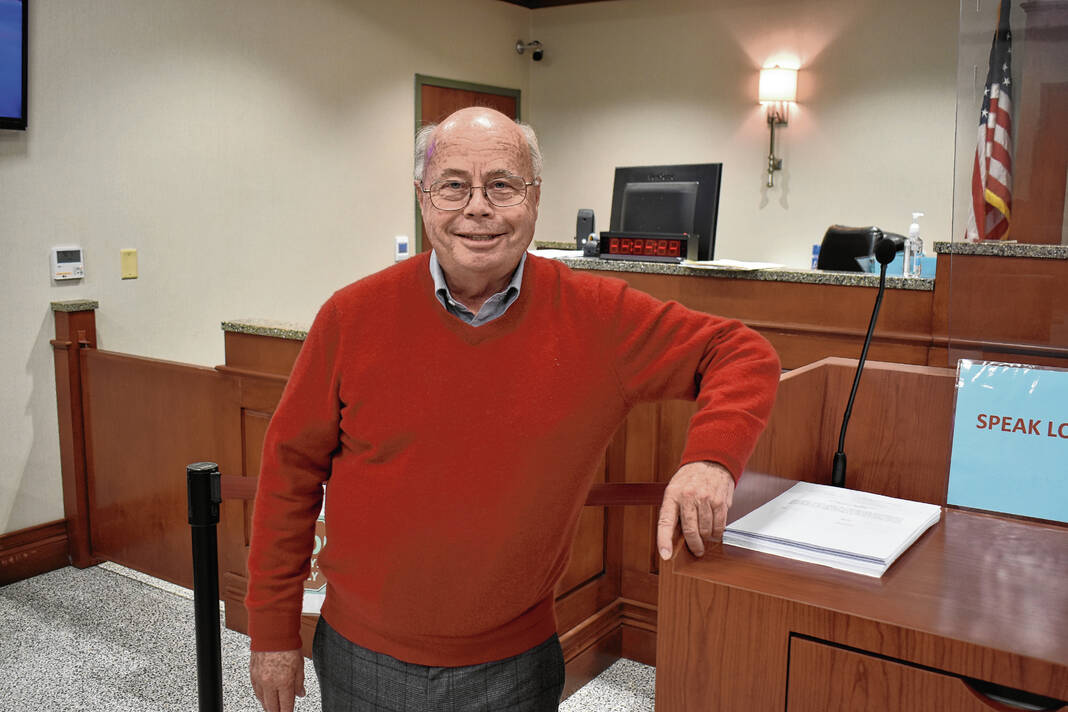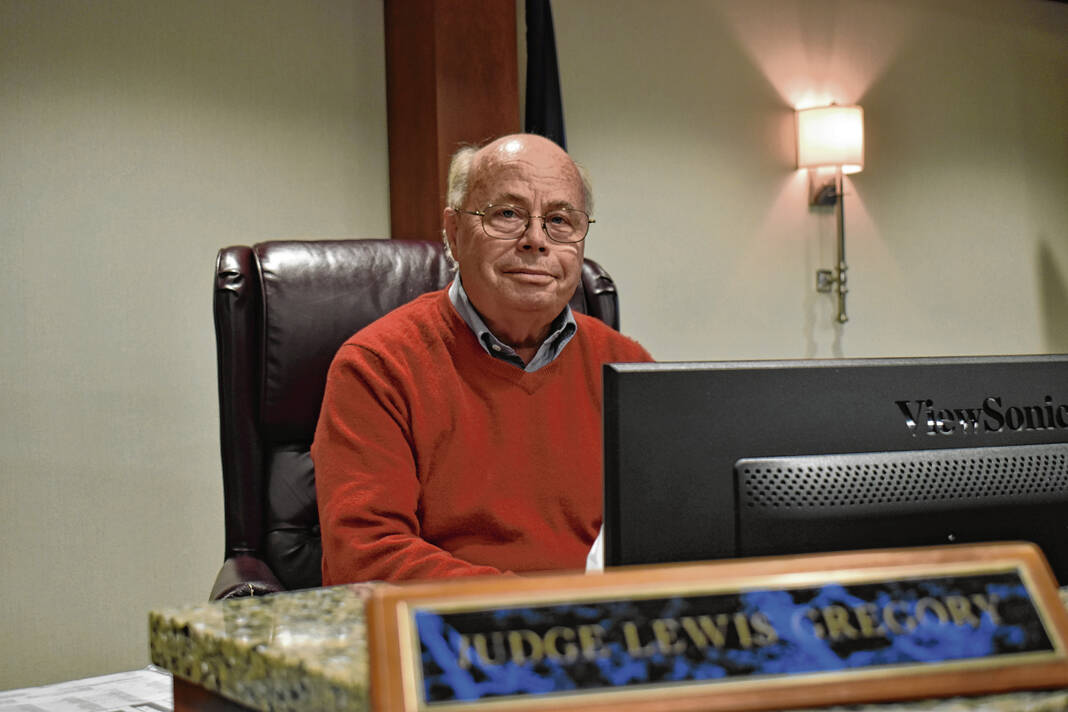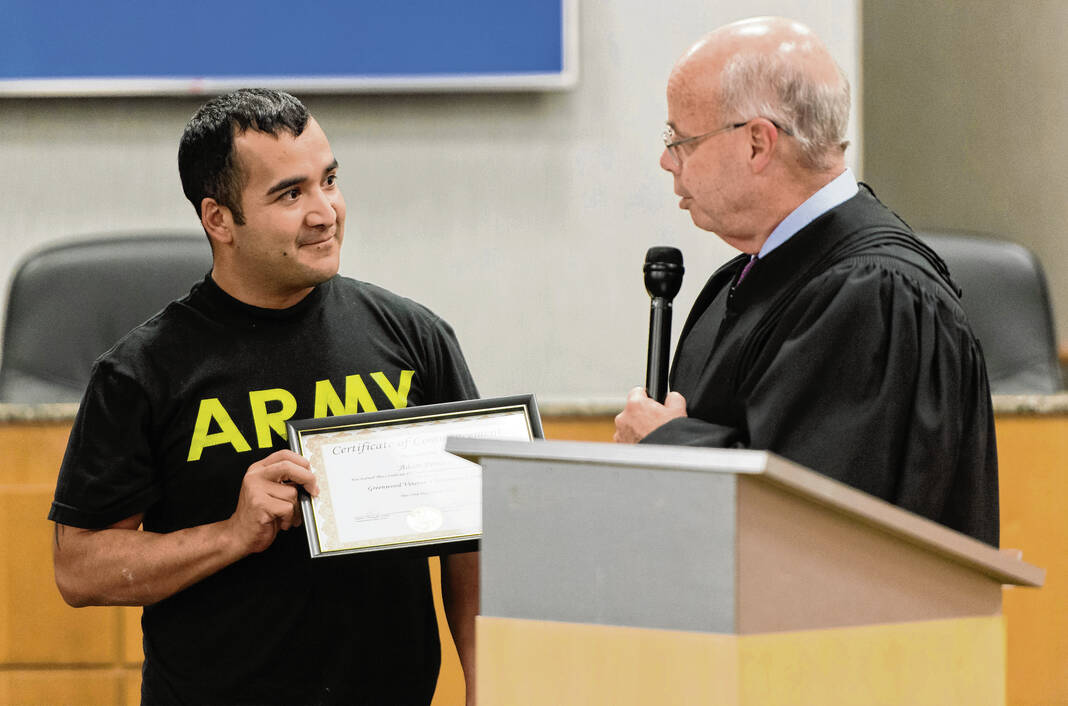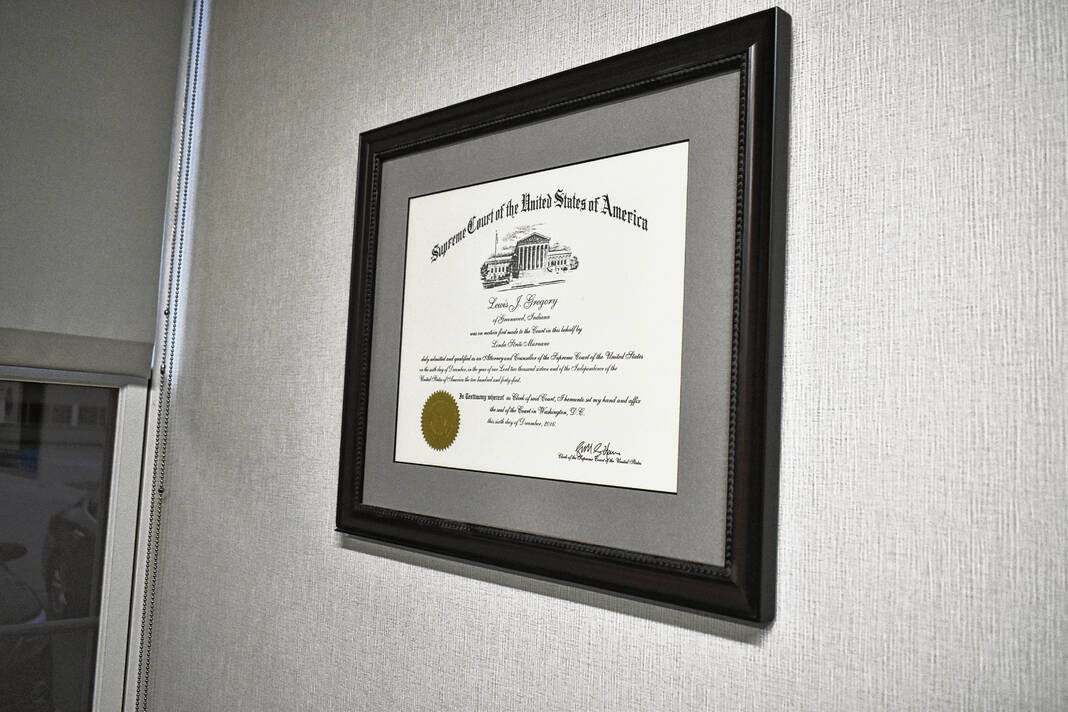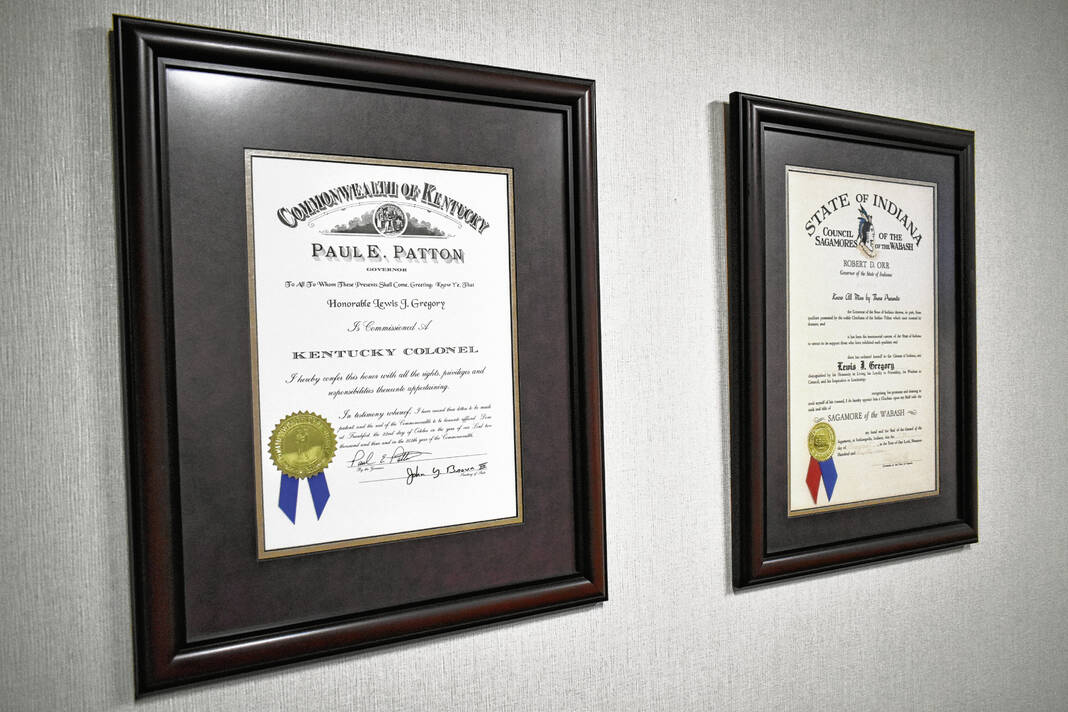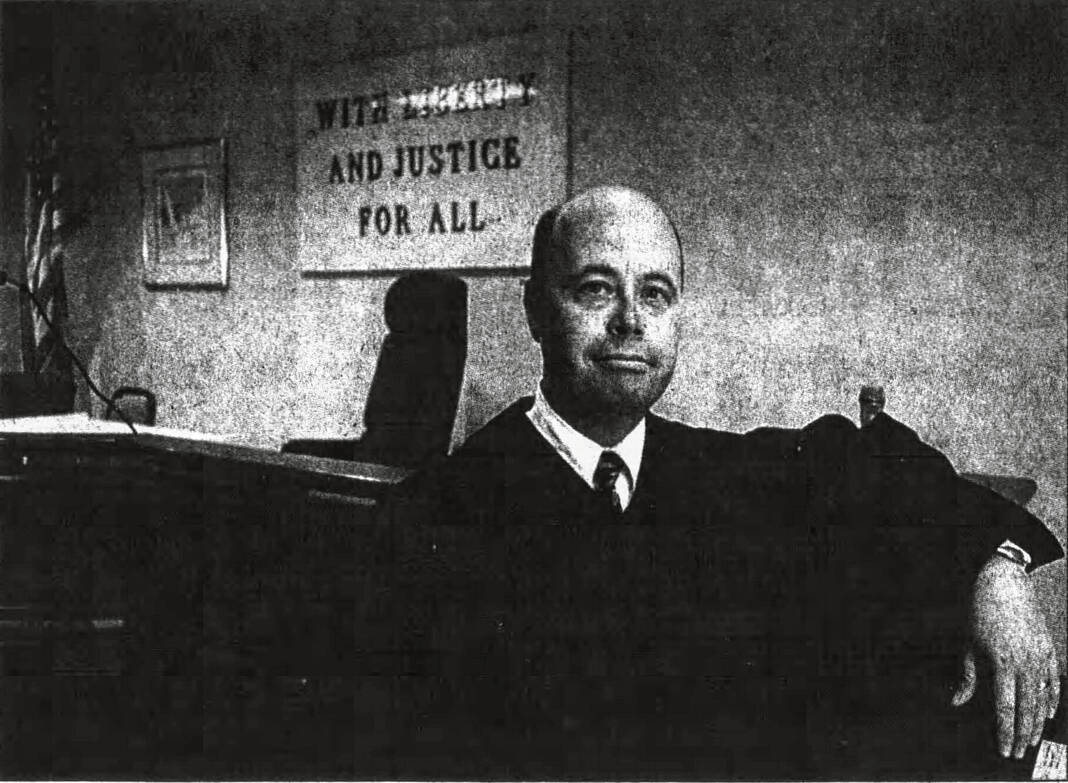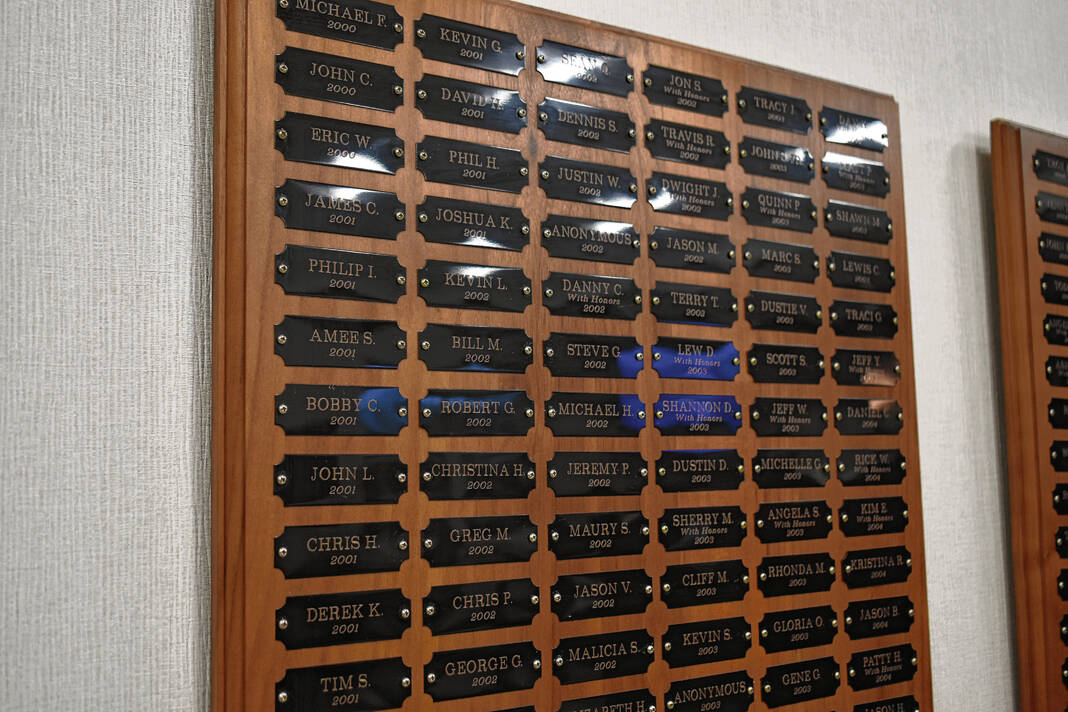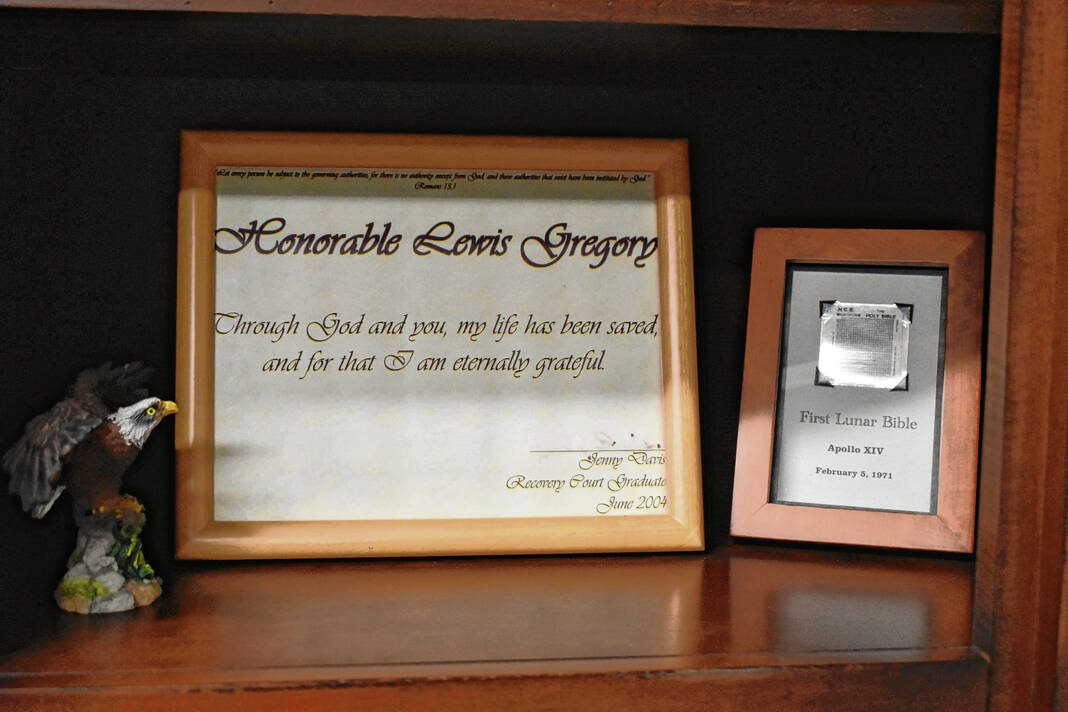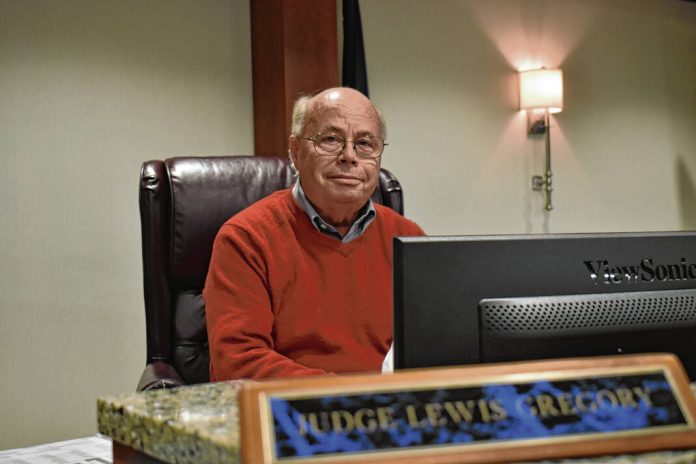
Greenwood City Judge Lewis Gregory sits behind his bench on Nov. 30. at the city’s Justice Center.
Noah Crenshaw | Daily Journal
Greenwood’s longtime city court judge never dreamed he would serve the city for 28 years.
Nevertheless, Lewis Gregory is grateful for his time as judge and proud of what he accomplished.
The city court’s judge since January 1996, Gregory is preparing to leave office at the end of this year. The Republican was voted out of office in the May primary when voters selected city attorney Drew Foster to replace him. Foster was unchallenged in the general.
Gregory’s tenure as city court judge saw the creation of the city’s probation department and the establishment of some of the earliest problem-solving courts in the state and Johnson County with the creation of the Greenwood Recovery Court and the Greenwood Veteran’s Court.
But when Gregory first graduated college in 1974, he didn’t think he’d be a judge.
The road to judge
Gregory’s first job out of college was through an offer he received from the Indiana Republican Party, thanks in part to a call from a U.S. congressman he had worked with over the previous summer.
“It was awfully kind of him since otherwise I’d be unemployed,” Gregory recalled.
While at the state GOP, Gregory got to know state leadership. He was hired by then-Lt. Gov. Bob Orr as he prepared to run for governor in 1980. Once Orr was elected, Gregory became his executive assistant.
After the 1984 election, Gregory told Orr he wanted to go back to law school. Orr then offered him another state government job, appointing him to the state parole board.
This was where Gregory learned about criminal behavior and what to do and not to do when dealing with someone with criminal tendencies, he said.
Once admitted to the bar, Gregory became a deputy prosecutor from the Marion County Prosecutor’s Office. While there he worked with Johnson County Prosecutor Lance Hamner, who was then a deputy prosecutor for Marion County.
Gregory also helped Hamner with his first campaign for prosecutor in the early 1990s. Once Hamner was elected, Gregory became his assistant chief deputy prosecutor.
“As a deputy prosecutor, he was a very effective trial lawyer and very good at teaching trial skills to young deputy prosecutors,” Hamner said.
Flash forward to 1995, the Johnson County GOP chairman asked Gregory if he would consider a run as Greenwood City Judge that year.
“I agreed to do it, thinking it’d be one term,” Gregory said. He went on to serve for the next 28 years after being elected.
Setting the court
Once elected, Gregory began to see the needs at the court. He campaigned on a platform of having a probation department for the city court, which handles minor crimes like misdemeanors and miscellaneous traffic items.
Within a few years, a self-funded city probation department was created. As of Nov. 30, they had about $320,000 in the adult probation fund, which funds the city court’s various programs, Gregory said.
He also wanted to bring new thinking to the court. Sometimes the punishments did not accomplish what they were intended to, like making a convicted drunk driver write a three-page essay about why drunk driving is bad, he said.
“That accomplishes nothing. Nothing,” he said.
Early on with the probation department, Gregory began to come up with ideas for how to have offenders who come through the city court give back for the costs they incur on city resources. Offenders sentenced on probation have to spend a set amount of time giving back to the community through community service, and thousands of hours of work have been done benefiting the city and local nonprofits, Gregory said.
Change for an offender comes through a long period of making the “correct choices,” Gregory said. In the case of drug or alcohol issues, this would be keeping them away from the substances and giving them positive reinforcement. If they relapse, then you get them back into treatment, he said.
In 1997, Gregory heard of a new concept for the judicial system — drug treatment courts, an intensive court-sponsored recovery program for offenders who have a history of substance abuse. These courts, which now fall under the umbrella of problem-solving courts, were a revolutionary concept at the time.
Intrigued, Gregory reached out to the U.S. Department of Justice about starting one in Greenwood. In 1999, the court city’s Recovery Court began operations.
“We called it recovery court because I wanted to keep everything in there, in the program, as positive as possible. Recovery sounds like a hell of a lot better than drug treatment,” Gregory said.
There were not many courts like this when it began. The city court’s recovery court was the first certified Drug Treatment Court in the nation. Today, there are over 2,500 of these courts in the United States, he said.
Nearly a decade later, Gregory began to notice the city court had a higher influx of veterans making their way through the court in the aftermath of the wars in the Middle East. As he began to look into it, he found interesting trends.
Many of them had been good citizens in the past, joining the military and doing well while in the services. But when they got back, they got in trouble with the law.
“I’m thinking well, we need to have a program for the veterans,” Gregory said. “Between a heroin addict and a veteran who has nightmares every night, which one really deserves help? I’m not going to answer that question, but I think it’s a legitimate question.”
City court staff established the Veterans Court in 2013. Treatment is handled by the Veteran’s Administration, which has a staff member assigned to help make sure people get into treatment and get the resources they need, he said.
The city court’s recovery and veterans courts are also the first problem-solving courts to be established in Johnson County. Today, there is also an adult drug court in Johnson Circuit Court and a reentry court in Johnson Superior Court 2. A veteran’s court is launching next month in Johnson Superior Court 3, and mental health and juvenile courts are also being planned for other county courtrooms.
Several distinctions
Throughout his 28-year tenure, Gregory has been honored by two governors. He received the Sagamore of the Wabash, one of Indiana’s highest honors from Orr and received the Kentucky Colonel, one of that state’s highest honors, in the early 2000s.
He has also been admitted to the U.S. Supreme Court bar, a “fairly rare distinction,” he said. Only about 2 to 3% of all attorneys are admitted, he said.
“I think I got it because I didn’t screw up anything really important,” Gregory remarked.
These certificates and honors line the walls inside his chambers at the Greenwood Justice Center. He’s also received community awards and gifts from several of the past graduates of the city’s problem-solving courts. More than 500 people have graduated, he said.
Among the gifts is an artwork of the recovery court’s emblem done by a past graduate. The emblem is of a dragon and a sword, with the dragon representing addiction and the sword representing the tools to fight addiction.
“You can’t kill a dragon but you can control it,” Gregory said. “If you have an addiction, you’ll always have the addiction. But you don’t have to surrender to the addiction. That’s why there’s a sword there; you get the tools you need to keep the dragon at bay.”
Dustin Burton, former chief probation officer for the city court, has gotten to know Gregory well over the last decade. Although he is now a veteran’s court case manager for the Johnson County Probation, he first began his work in probation at the Greenwood City Court as a probation officer, before also adding on roles helping manage the recovery and veteran’s treatment courts.
He describes Gregory as a passionate trailblazer for his efforts in getting the city’s problem-solving courts started. These courts are very prevalent today, but when Gregory started the recovery court, it at the forefront of the movement.
“He’s very hands-on with that,” Burton said.
Hamner says Gregory was innovative and creative in bringing the programs to the city court. The recovery court in particular is very effective, he said.
“We send a lot of defendants through that because it was very effective at helping people who were addicted to drugs and alcohol to get their lives turned around,” Hamner said. “We had a lot of a lot of success with that and even though it was a rigorous program, it was very effective for people who had a sincere desire to overcome their addictions.”
Preparing for a new chapter
The problem-solving courts are something near and dear to Gregory’s heart. With his time in office coming to an end, and the county having launched its own programs, he hopes similar programs will continue for the future.
“I don’t know that it’s necessary that Greenwood keeps the recovery court, but I hope that we have some program somewhere in this county that can do the things that recovery court has done for the last 25 years,” he said.
Burton says he doesn’t know where the county’s problem-solving courts would be today if it weren’t for Gregory getting them started. He’s also seen the benefits of Gregory’s courts in the real world.
“I work with a woman here who graduated from one of those programs many, many, many years ago,” Burton said. “She’s coming up on her 20 years of sobriety in January, and she credits his program to saving her life.”
Gregory has walked into courtrooms to not just see their resolutions but to make a difference in the lives of the people who were on his docket. This is what his legacy will be, Hamner said.
“City courts have a high volume of cases, and the judges do need to move those cases quickly,” Hamner said. “But I think Judge Gregory always gave individual attention to each person who came through there.”
One of the best parts of having been judge for so long is having worked with amazing staff members over the years, Gregory said. There have been many amazing staff members who have worked for the court and helped with the recovery programs. They’ve been so good they’ve often been wooed away from Greenwood by other programs, he said.
The people, both staff and the people in the recovery programs are what Gregory will miss most. He’s always met with participants at least once every two weeks, talking about what they’ve done, what their challenges are and where they can go from there, he said.
As for the future, Gregory knows he doesn’t want to retire. At 71, he considered it and even tried it for a few days. But then he realized how much he needed to continue to do something. What that will be, he’ll figure out once he is out of office, he said.
His parting advice for Greenwood? He hopes people remember that everyone makes mistakes and that not everyone who comes through city court is a “bad guy.”
Gregory also hopes residents will appreciate his efforts over the years.
“I’d like them to know that I tried to make it a better place, the city, the community,” he said.


